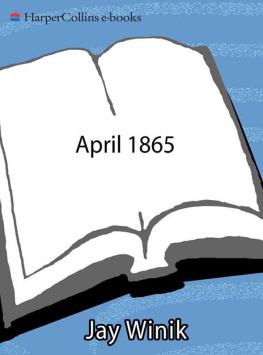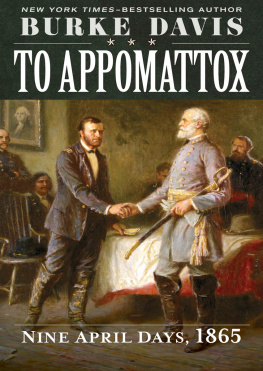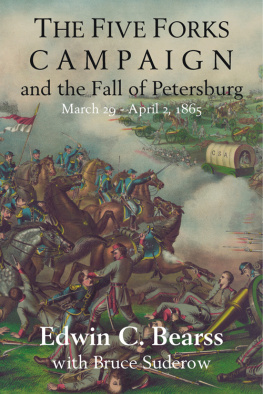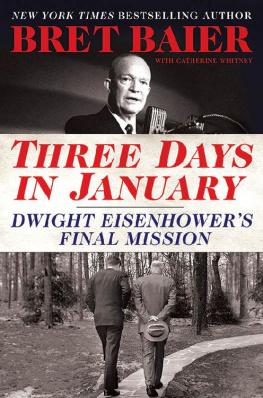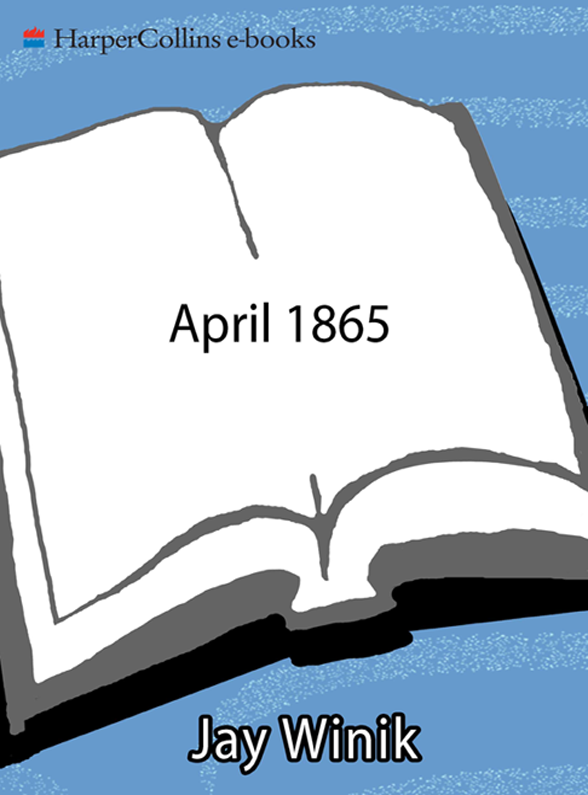C ONTENTS
P relude
A Nation Delayed
Epilogue
To Make a Nation
For Lyric, my North and South, and East and West
A tlanta had been overwhelmed. Columbia had been surrenderedand burned. Charleston had been abandoned. The peace conference at Hampton Roads had been fruitless. And the British and the French had refused to intervene. The Army of Northern Virginia, after striking its own harsh blows against the Union in the six bloodiest weeks of the war, from the Wilderness to Cold Harbor, had wriggled free of the enemys clutches and fallen back, converging in a defensive position around Petersburg and Richmond.
Across the slim divide of the battered landscape lay Grants swelling Army of the Potomac.
It was the Confederacys direst crisis since the start of the war, vaster than the fall of Vicksburg, more terrible than the failure at Gettysburg, and more traumatic than the toll of Sharpsburg. This time, the South stood irrevocably alone. But as smoky light filtered off the James River below Richmond, a strange emotion prevailed throughout much of the Confederacy. It was, Southerners knew, not the first time in history that defenders had been pitifully whittled down into pieces by attacking legions, cut in half, starved, demoralized, enervated, and yet somehow had found the will to prevail. They still had four armies in the field, and man for man some of the finest fighting men in all of the history of warfare. Their guerrilla fighters and cavalry were second to none. Their lineage, they reminded themselves, was impeccable, stretching from the Jamestown colonists of 1607 to the Founding Fathers of 1776, and included George Washington himself. This kindled and rekindled their dwindling resolve. So did their prayers. And so did their own spirithowever waning.
And so fervent were they in their desire to earn their independence that after an extensive, protracted debate, they had even held out the promise of freedom to any black man who would fight for their cause.
Now, confronted by the dreaded prospect of losing all, they looked to their leadership, for another George Washington, a figure who could rescue the South. In these desperate times, after all the suffering and death, after the multitude of exhaustion and despair, such a manor such menwas the Confederacys final chance.
In the trenches of Petersburg, there was such a man, and across the Confederacy, there were such men. As a weary Abraham Lincoln, who had braced the Union when the blood was thick and victory seemed lost, so deeply feared, Robert E. Lee and the generals who looked to him for leadership, and a good many of the Confederate citizens who looked to him for guidance, were as aggressive as ever: not ready to give up, to give in, or to relinquish their Confederate identity burnished in the fires of war. This war was not over. Not by a long shot. And the implications for the peace to follow were profound.
It is the eve of April 1865.

Even today, what followed in the remaining days of the Civil War seems almost miraculous. April 1865 is a month that could have unraveled the American nation. Instead, it saved it. It is a month as dramatic and as devastating as any ever faced in American historyand it proved to be perhaps the most moving and decisive month not simply of the Civil War, but indeed, quite likely, in the life of the United States.
Too often, it is at a small red brick house in Appomattox, Virginia, on April 9, 1865Robert E. Lees fateful meeting with U. S. Grantthat the story of the Civil War stops. Yet this is a mistake. For one thing, the war was still not over; it could have lasted several more hard months, even years. For another, no period was more harrowing, or had so great an impact upon this country, as the days that followed Lees surrender. Within six days, Abraham Lincoln was dead, the first-ever assassination of an American president. Never before or since in the life of this nation has the country been so tested as in this one week alone. Nor have so many tales of human drama and so many remarkable eventssurrender and assassination but two among themoccurred with such breathtaking simultaneity and far-reaching consequences, within a simple span of some thirty or so days.
Indeed, the whole of April 1865 was marked by tumult and bloodshed, heroism and desperation, freedom and defeat, military prowess and diplomatic magnanimity, jubilation and sorrow, and, finally, by individual and national agony and joy. Consider a few unforgettable images: this one month witnessed the poignant, frenzied fall of the rebel capital at Richmond and its government on the run; Lincolns unprecedented walk through Richmond the next afternoon, as the city still smoldered and burned and its newly freed blacks brushed him with their hands; one of the most savage battles of the war, fought along Saylers Creek, and the daringand dauntingprospect of the South forming guerrilla groups to press the conflict and bleed the North, with grave, long-term consequences. It saw Lees defiant efforts to head south and reunify with General Joe Johnston, while fervently proclaiming we must all determine to die at our posts; the Army of Northern Virginia force-marching in a labored, hurried retreat, an unduly complicated effort marked by heartbreaking mistakes, remarkable stoicism, and near split-second decisions with cataclysmic results; Lees reluctant yet dignified surrender to Grant at Appomattox, accompanied by Grants equally dignified, and largely unprecedented, handling of his fallen foe, a masterful act that set the tone for the rest of the war and the peace to come. It glimpsed Lincolns eerie premonitions of death just days before his own assassination, followed by the successful plot to kill the president and a near-successful plotfoiled only at the last momentto decapitate the entire Union government, threatening the revival of more ruinous war. And while sporadic fighting continued in the South, the Union was plunged into near chaos as the first-ever presidential transfer of power in a crisis commenced, amid widespread hysteria and rage, with the inauguration of Andrew Johnson of Tennessee, an illiterate until age twenty-one, who had met with Lincoln only once since the inauguration. This one month also beheld an angry nationwide search for John Wilkes Booth, while intensive on-again, off-again negotiations were waged over a ten-day span to produce General Johnstons eventual surrender to William Tecumseh Shermanas other rebel generals and would-be guerrillas in the Deep South, in the backwoods, and in the Far West watched, waited, and pondered their next steps. And, of course, it ushered in the start of the nations reunification.
But even as the war climaxed to a close, there remained the most significant question of allone that had consumed Abraham Lincoln, haunted him, kept him awake at night, and etched lines of worry deep in his face: not simply how to subjugate the Confederacy by force of arms, but, more importantly, how to reunite two separate political, social, and cultural entities that had been bitter military enemies just days before. There is no greater [task] before us, Lincoln bluntly told his cabinet, or for that matter, before any future Cabinet. In truth, this was the foremost challenge of April 1865. This accomplishmenttwo nations becoming oneperhaps among the most momentous of all time, makes the story of April 1865 not just the tale of the wars dnouement but, in countless ways, the story of the making of our nation.

